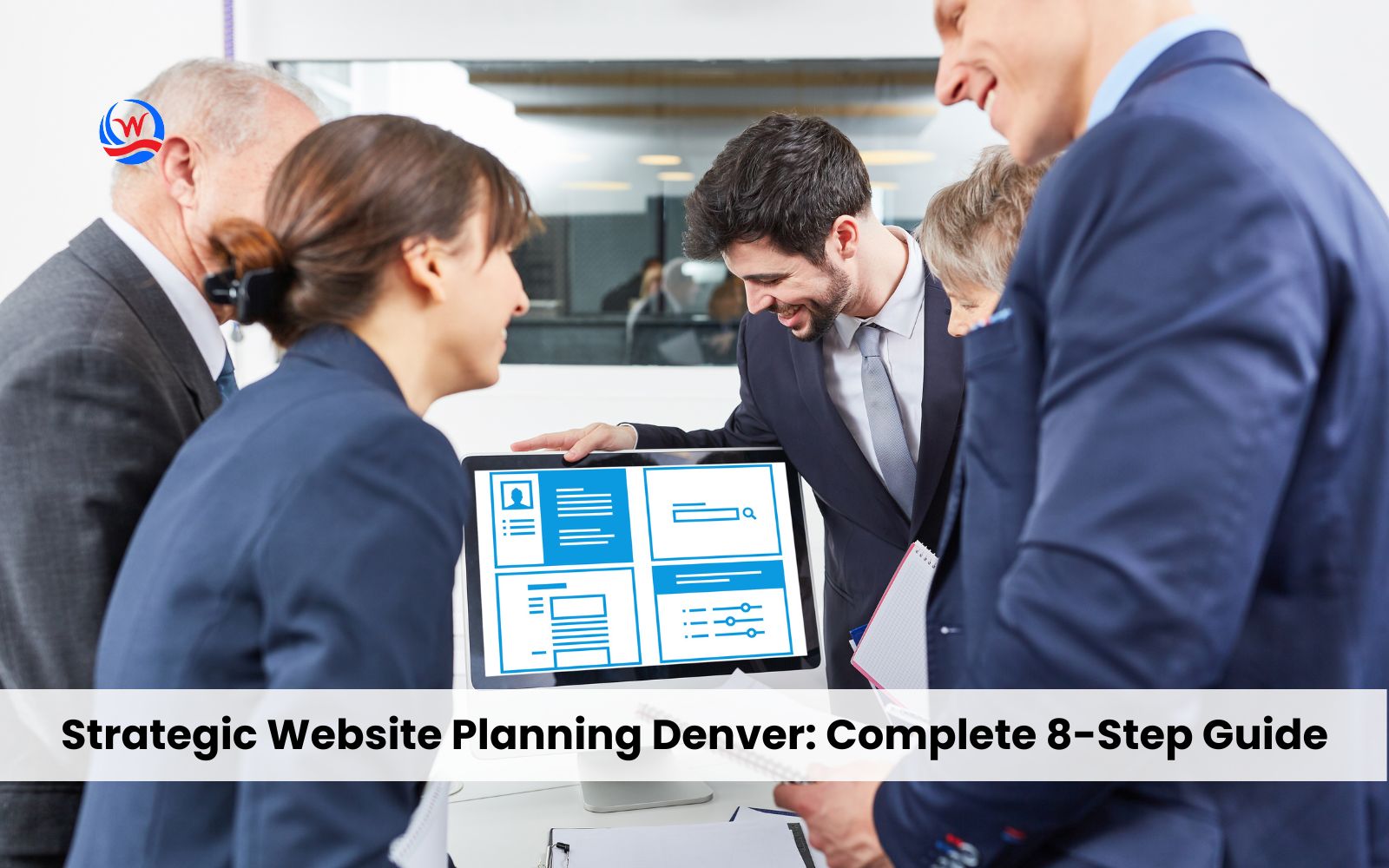Strategic website planning Denver goes beyond choosing colors and layouts. It’s about creating a comprehensive roadmap that aligns your digital presence with your business objectives.
For Denver entrepreneurs, this approach is crucial given the Mile High City’s unique market dynamics and fierce local competition across industries from tech startups to outdoor recreation businesses.
Denver businesses face distinct challenges online: competing against established local players, standing out in saturated markets and fighting for visibility against national brands targeting Colorado consumers. Without strategic website planning, you’re essentially building a house without blueprints.
What you’ll gain from this guide:
- A step-by-step strategic website planning process tailored for Denver businesses
- Proven techniques to increase website conversions and ROI
- Local market insights that give you competitive advantages
- Tools and resources to implement your website strategy effectively
Ready to transform your online presence? Let’s start with why strategic planning matters more than ever for Denver businesses.
Why Strategic Website Planning Matters for Denver Businesses
Denver businesses with strategic website planning see average ROI increases of 250% within the first year, compared to those who build websites reactively.
These planned sites convert 5-8% of visitors on average, while unplanned websites typically convert only 1-2%. That difference translates to thousands of dollars in lost revenue monthly for most businesses.
Common mistakes plague Denver websites: generic content that could apply to any city, neglecting mobile optimization despite 68% of local searches happening on mobile devices, and failing to optimize for “near me” searches that drive 76% of local business traffic.
Many business owners treat website development as a technical project rather than a marketing investment, resulting in beautiful sites that don’t generate leads.

The Strategic Website Planning Process
Step 1: Setting Clear Business Goals for Your Denver Website
Strategic website planning begins with SMART goals that guide every decision.
Your website goals should directly align with broader business objectives, whether that’s increasing qualified leads, expanding into new Denver neighborhoods, or establishing thought leadership in your industry.
Effective website metrics go beyond vanity numbers like page views. Focus on conversion-oriented metrics: cost per lead, customer lifetime value from web traffic, and local search ranking positions for high-intent keywords.
Examples of effective website goals for different Denver business types:
- Service businesses: Generate 50 qualified leads monthly through contact forms and phone calls
- E-commerce retailers: Achieve 4% conversion rate on local traffic within six months
- B2B companies: Convert 15% of website visitors into email subscribers for nurture campaigns
- Restaurants: Drive 25% of reservations through online booking system
Step 2: Understanding the Denver Market and Your Audience
Demographic analysis reveals Denver’s diverse market segments. The median age is 34, with 45% holding bachelor’s degrees or higher. Household income averages $78,000, and 72% of residents actively research purchases online before buying locally. This educated, tech-savvy population expects sophisticated digital experiences.
Creating Denver-specific buyer personas involves layering geographic data with lifestyle preferences. Your typical customer might be a 32-year-old professional living in RiNo, earning $65,000 annually, who values work-life balance and supports local businesses. They research on mobile during commutes and prefer companies that offer convenient online scheduling or purchasing.
| Demographic Category | Denver Data | Website Implications |
| Median Age | 34 years | Modern, mobile-first design |
| Education Level | 45% college+ | Detailed, informative content |
| Mobile Usage | 68% local searches | Responsive, fast-loading pages |
| Local Preference | 78% prefer local | Emphasize Denver connections |
Competitive analysis tools help identify opportunities your competitors miss. Use SEMrush for keyword gaps, analyze their website user experience, and identify content topics they haven’t covered. This research informs your strategic website planning Denver approach.

Step 3: The Denver Website Planning Process: Step-by-Step
The strategic website planning process follows eight critical phases designed specifically for Denver market success:
- Business goal alignment and success metrics definition
- Target audience research and persona development
- Competitive analysis and market positioning
- User experience mapping and conversion funnel design
- Content strategy and SEO keyword planning
- Technical requirements and integration planning
- Design framework and brand consistency guidelines
- Launch strategy and performance monitoring systems
Each step builds upon previous work, creating a comprehensive roadmap for your website development.
Business goal alignment ensures every page serves a purpose in your sales process. Audience research informs messaging and functionality decisions that resonate with Denver customers.
User experience mapping visualizes how visitors move through your site toward conversion goals. Denver customers typically require 3-4 touchpoints before making purchase decisions, so your UX must facilitate smooth progression through awareness, consideration, and decision phases.
Step 4: Keyword Strategy
Unlike national SEO, local keywords must balance search volume with geographic relevance.
“Denver web design” might have lower search volume than “web design,” but it attracts qualified local prospects more likely to convert.
High-conversion Denver keywords typically include location modifiers, service intentions, and urgency indicators. “Emergency plumber Denver” converts better than “plumbing services” because it captures immediate need and local intent. Your strategic website planning should prioritize these high-intent, location-specific terms.
| Keyword Type | Example | Monthly Searches | Conversion Rate |
| Primary | Strategic website planning Denver | 480 | 8.2% |
| Long-tail | Cost-effective website planning Denver | 140 | 12.1% |
| LSI | Denver web design strategy | 320 | 6.8% |
| Geo-targeted | Website planning services Highlands | 90 | 15.3% |
Ongoing keyword monitoring uses tools like Google Search Console, SEMrush, and local rank tracking software. Monthly reviews identify new opportunities and seasonal trends affecting your Denver market visibility.
Step 5: Content Planning and Development
Strategic content calendars align with Denver’s seasonal patterns and local events. Summer content might focus on outdoor industry businesses preparing for peak season, while winter content could address service companies managing weather-related demand spikes.
Local content idea generation draws from Denver’s unique characteristics: craft brewery culture, outdoor recreation focus, startup ecosystem, and environmental consciousness.
These themes resonate with local audiences while supporting your website SEO goals.
Types of content that perform well with Denver audiences:
- Local case studies and customer success stories
- Industry insights specific to Colorado regulations or market conditions
- How-to guides addressing regional business challenges
- Community involvement and local partnership announcements

Step 6: User Experience Design for Higher Conversions
User experience impacts conversion rates – improving site usability can increase conversions by 200% or more. Denver users expect intuitive navigation, fast loading times, and mobile-optimized experiences that work seamlessly across devices.
Mobile optimization statistics reveal 68% of Denver users search for local businesses on mobile devices, with 76% visiting or contacting businesses within 24 hours of mobile searches.
Critical UX elements that influence conversion:
- Clear value proposition visible within 5 seconds
- Prominent contact information and call-to-action buttons
- Simplified navigation that guides users toward conversion goals
- Trust signals like testimonials, certifications, and local business credentials
- Fast page loading speeds (under 3 seconds for optimal performance)
Page speed optimization becomes crucial as Google prioritizes fast-loading sites in local search results. Denver users expect responsive websites—delays longer than 3 seconds result in 53% of visitors abandoning your site.
Step 7: Technical Planning Considerations
Technical planning ensures your website foundation supports business growth and user expectations. Security considerations protect both your business and customer data, particularly important for e-commerce and service businesses collecting sensitive information.
Scalability planning anticipates business growth – your website should handle increased traffic, expanded product lines, and additional functionality without requiring complete rebuilds. Cloud-based hosting and modular design architectures support cost-effective scaling.
Essential technical elements to include in planning:
- Responsive design framework for all device types
- Content management system for easy updates
- Analytics and tracking implementation
- Search engine optimization technical foundation
- Security protocols and data protection measures
- Performance optimization for fast loading speeds
Step 8: Pre-Launch Strategy and Quality Assurance
Thorough pre-launch testing prevents embarrassing errors and ensures optimal user experience from day one.
Essential testing protocols cover functionality, compatibility, performance, and user experience across different browsers and devices.
Step-by-step pre-launch checklist:
- Cross-browser compatibility testing on major browsers
- Mobile responsiveness verification on various screen sizes
- Form submissions and contact system functionality
- Page loading speed optimization and testing
- SEO elements verification (titles, descriptions, schema markup)
- Analytics and tracking code implementation
- Content proofreading and fact-checking
- Security scanning and vulnerability assessment
Training considerations help internal teams manage website updates, content publishing, and basic maintenance tasks. Proper training reduces ongoing costs and ensures website content stays current.
Post-launch monitoring systems track performance metrics, user behavior, and technical issues. Setting up automated alerts for downtime, performance problems, or security concerns protects your online business presence.

Measuring Success: KPIs for Denver Businesses
Website performance measurement requires tracking metrics that relate to business outcomes.
Vanity metrics like page views don’t tell the complete story – focus on conversion-oriented KPIs that demonstrate ROI from your strategic website planning Denver investment.
Proper tracking setup captures local conversions through Google Analytics goals, call tracking numbers, and form submission monitoring. This data reveals which marketing channels and website elements drive the highest-quality leads.
| Business Type | Primary KPIs | Secondary KPIs |
| Service Business | Qualified leads, phone calls | Email signups, consultation requests |
| Retail/E-commerce | Online sales, conversion rate | Average order value, return customers |
| B2B Companies | Demo requests, whitepaper downloads | Newsletter signups, webinar attendance |
Local traffic analysis identifies geographic patterns in your website visitors. Understanding which Denver neighborhoods generate the most traffic and conversions helps optimize local SEO and advertising efforts.
Frequently Asked Questions (FAQs)
How early should I start planning my website?
Begin strategic website planning 2-3 months before your desired launch date. This timeline allows thorough research, proper planning, and quality development without rushing critical decisions.
Can you help improve my existing website’s strategy?
Yes, we provide strategic audits and optimization plans for existing websites. Many improvements can be implemented without complete redesigns, delivering faster ROI.
How long does the website planning process take?
Strategic website planning typically takes 2-4 weeks, depending on project complexity and your responsiveness to information requests. Thorough planning prevents expensive changes later.
Do you offer ongoing website performance monitoring?
Yes, we provide monthly performance reports and optimization recommendations. Ongoing monitoring ensures your website continues delivering results as your business grows.
Choose The Ocean Wide for Website Planning in Denver
The Ocean Wide specializes in strategic website planning for Denver small businesses and startups. Our local team understands Denver’s unique market dynamics, from the competitive downtown business district to emerging neighborhoods like RiNo and Stapleton.
Our experience with Denver entrepreneurs spans diverse industries: tech startups seeking rapid growth, established service providers expanding their reach, and retail businesses building e-commerce capabilities. Personalized strategy sessions ensure your website plan aligns with your specific business goals and market position.
Ready to transform your online presence?
Contact us at (720) 334-0899 or email [email protected] for a free strategy consultation.
We’ll analyze your current website performance and outline opportunities for improvement through strategic planning.
Conclusion
Strategic website planning Denver approaches deliver measurable results: higher conversion rates, improved ROI, and sustainable business growth through your online presence. The investment in proper planning pays dividends for years through increased lead generation and customer acquisition.
Immediate action steps you can take:
- Audit your current website performance using Google Analytics
- Research your top 3 competitors’ websites and identify improvement opportunities
- Define specific, measurable goals for your website’s business impact
- Create buyer personas based on your actual Denver customers
- Schedule a strategic planning consultation to accelerate your progress
Don’t let another month pass with an underperforming website. Your Denver competitors are investing in strategic website planning – make sure you’re not left behind.
